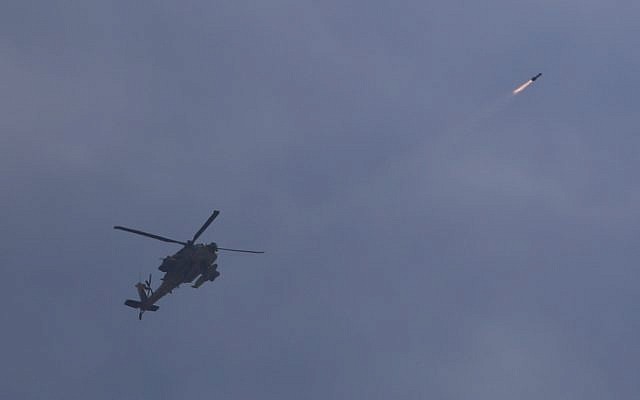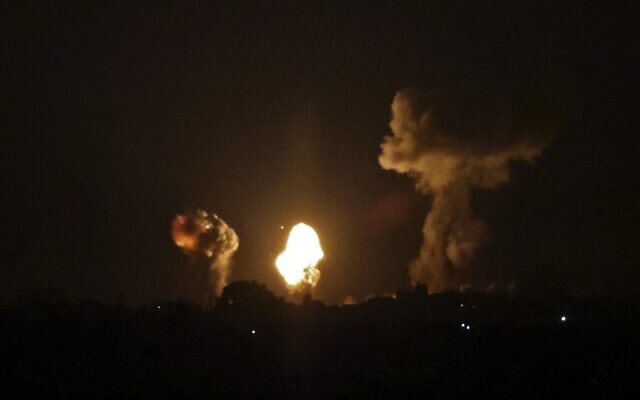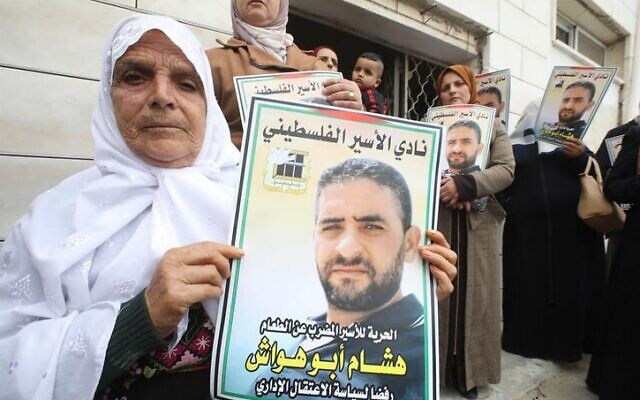Hamas rarely launches surface-to-air missiles at Israeli manned aircraft; military says attack caused no injury or damage

In a rare incident, Gazan terrorists targeted Israeli military helicopters with shoulder-launched anti-aircraft missiles over the Strip early Sunday morning during airstrikes carried out by the Israel Defense Forces.
During retaliatory airstrikes shortly after midnight, Hamas operatives fired two SAM-7 anti-aircraft missiles toward raiding helicopters west of Gaza City, Palestinian media outlets said.
The IDF confirmed that anti-aircraft missiles were fired at the helicopters, but would not comment on how many. The military said the missiles missed their mark and caused neither injury nor damage.
The SAM-7 missile, also known as 9K32 Strela-2, is a Russian-made shoulder-launched surface-to-air missile. They are relatively outdated, having been first made in the 1960s, but remain in use today.
The Israeli airstrikes, which were carried out by both helicopters and fighter jets, were in response to two rockets that were fired from Gaza on Saturday morning, which landed off the coast of central Israel.
Video footage showed one explode in the sea off the coast of Jaffa, next to Tel Aviv, while the second reportedly landed off the coast of Palmachim, south of the city of Rishon Lezion.
Hamas has claimed that it did not fire the rockets intentionally, but that they were triggered by inclement weather. Israeli military officials have said in similar cases in the past that due to the shoddy electrical work on Hamas’s rockets, the projectiles could be set off prematurely by weather conditions, notably lightning strikes.
According to the Kan public broadcaster, Israeli officials believe the Palestinian Islamic Jihad terror group was responsible for the rocket fire, and not Gaza’s rulers, Hamas. The network said Hamas conveyed to Israel via Egyptian mediators that it was not responsible.
The IDF said its strikes in the predawn hours of Sunday morning targeted “a rocket production facility belonging to the Hamas terror group.” IDF tanks also targeted outposts in northern Gaza, the military said.
Hamas media said Israeli warplanes struck a Hamas outpost west of Khan Younis, in the southern part of the Strip.
In addition to its military strikes, Israel also informed Egypt, which has served as a mediator between it and Hamas, that the incident was unacceptable, even if the rockets were launched by accident.
“Hamas is responsible and bears the consequences for all activity in and emanating from the Gaza Strip,” the IDF said in its statement early Sunday morning.
Video from Gaza reportedly shows the two rocket launches toward the coast of Tel Aviv this morning pic.twitter.com/EPoAQIpy6T
— Emanuel (Mannie) Fabian (@manniefabian) January 1, 2022
On Sunday morning, security cabinet member Justice Minister Gideon Sa’ar told Army Radio that “all the pretexts of lightning and weather — it’s systematic. The weather didn’t fire the rockets, we view Hamas as responsible.”
Sa’ar argued that Israel’s response was proportionate and represented a “far tougher” policy than that of the previous government.
The Ynet news website quoted unnamed Israeli security sources saying that if Hamas cannot prevent rocket fire toward Israel in bad weather conditions, the group should disarm itself of rockets entirely.
Defense officials said Israel had been seeking to respond in a way that would “not cause an escalation but convey the message that incidents on the border and rocket launches are unacceptable.”
The Beirut-based Al-Mayadeen TV, citing unnamed sources, said the Hamas terror group informed Egyptian mediators that if Israel strikes in Gaza, it would lead to a response. Egypt reportedly urged Israel not to respond at all to the rocket fire.

The military wing of Islamic Jihad had reportedly received instructions from the group’s leadership to be ready to respond in the event of the death of a hunger-striking Palestinian prisoner.
Hisham Abu Hawash, a Palestinian from the small town of Dura, near Hebron, has been on a hunger strike in protest of his detention by Israel for 137 days, according to his lawyers.
Hamas in a statement said it was also closely watching the condition of Abu Hawash, claiming that he is being subjected to “a slow execution.”
Palestinian factions in Gaza have regularly threatened renewed violence in response to the conditions of hunger-striking prisoners. Most of these threats have not materialized; in most cases, Israeli authorities either agree not to renew the detainees’ detention or the prisoners end their fast.

Saturday’s rocket fire came after an Israeli civilian was shot on the Gaza border on Wednesday, prompting retaliatory strikes by the Israeli army.
The lightly-injured Israeli man was a worker for a civilian firm hired by the Defense Ministry for maintenance of the recently completed security barrier separating Israel and the Palestinian enclave.
After the shooting, the Israeli army said tanks attacked several Hamas outposts in northern Gaza. The Hamas-run Gaza Health Ministry said three Palestinians were wounded.
The incidents came after a relatively quiet period and amid intense efforts to reach a stable, long-term ceasefire following a major escalation of violence last May which saw thousands of projectiles fired at Israel and the IDF responding with strikes.
However, reports in recent days have suggested efforts have stalled for a potential deal that would see Hamas release two Israeli civilians and the bodies of two IDF soldiers it is believed to be holding, likely in exchange for Palestinian prisoners.
As reported by The Times of Israel
